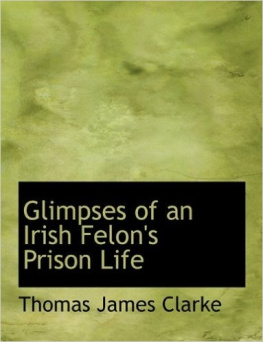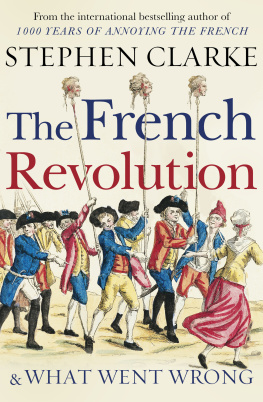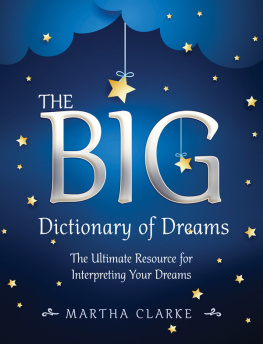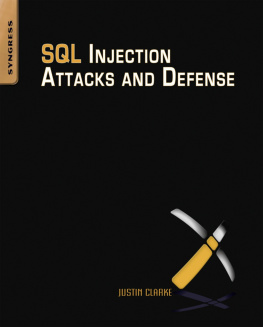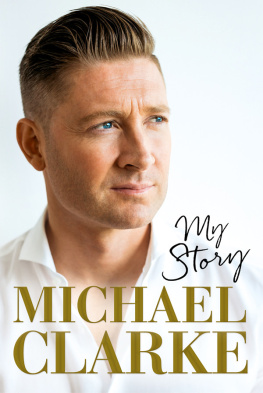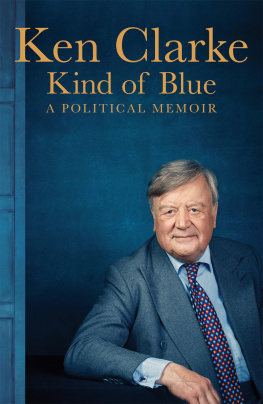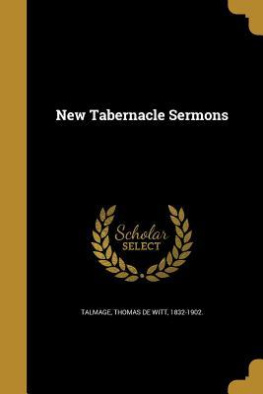INTRODUCTION
" But it seemed safe to classify as dangerous those toko were credibly reported to be in more than occasional or chance communication with some one or more of the small group of persons known in Dublin to be dangerously seditious, e.g., T. J. Clarke"Evidence of Mr. A. H. Norway at the Hardinge Commission.
THOMAS J. CLARKE was born in Hurst Castle, Isle of Wight, on the nth March, 1857, of Irish parents, his father, who was a soldier, being from Galway and his mother from Tipperary. Shortly after Tom's birth the family went to South Africa, and when he was about ten years old returned and settled down in Dungannon, of which town he always regarded himself as a native. He left Ireland for America in 1881, and returned in 1883 on a special mission from the Clan-na-Gael, as a result of which he was arrested and, in May 1883, sentenced to penal servitude for life, serving actually 15 \ years, and being released in September 1898. He went to America again in 1899, and returned in 1907 and settled in Dublin, where he went into business as tobacconist and newsagent. He was the first Signatory to the Proclamation of the Irish Republic, and was shot in Kilmainham Jail on the 3rd May, 1916, aged 59 years.
I first met Tom Clarke in, I think, 1909, and in the years of close association that followed came to know him well and to love him well. To all the young men of the Separatist movement of that time he was a help and an inspiration. And he was surely the exception in his own generation, the one shining example. It was a time of struggle in the Separatist movement, a time when the least little thing might have tilted the balance the wrong way, when, as it happened, Tom Clarke tilted it the right way. There comes in every movement a time when there is a clash between the younger generation and the older generation, and that clash was brewing in the I. R. B. just about that time. There was, on the one hand, the older generation which had got into a groove, which had no policy for the movement save the policy of keeping the spirit alive, which in effect throttled all attempt at a forward policy and believed that nothing in the way of action was possible. And there was, on the other hand, the younger generation, which believed in a forward movement, wanted a forward movement, and believed in its own capacity to run such a movement. After a long period of splits, a period during which the young men as a whole had avoided it, the I. R. B. had at last succeeded in closing up its ranks, and in those ranks were plenty of the young men, men with vision and purpose, men who wanted to do something. And naturally and inevitably they pushed to the front. They were regarded by the older men with some alarm, as people who by some rashness, by some disregard of the policy of giving no signs of life, would imperil the whole movement. And it was inevitable that there should be a struggle. For a good while it was a silent, an almost imperceptible struggle, but it came to a head in the autumn of 1912, and the young men won, won only just in time. Tom Clarke had stood with us from the first, and I can still remember the thrill of pleased surprise with which I saw him, after I first met him, stand for every proposal which the other men of his generation frowned at and would down. One thing in particular which all of us had at heart, and a thing which eventually had a profound influence in the right direction on the whole development of thought in Ireland, the starting of Irish Freedom, was due wholly to Tom. We young men had a paper as our first thought, but before we thought the time opportune to propose it the proposal came from Tom Clarke, and we carried it. The result was Irish Freedom, which gave to the Separatist movement in Ireland unity and philosophy, and which had an influence in making the Ireland of to-day which has not yet been recognised. We all worked for it without stint and without cessation, and Tom Clarke as keenly and as effectively as the youngest amongst us.
The full story of the Insurrection of 1916 will some day be given publicity : but apart from the actual details of the events leading up to it, it is time that the main event, the really proximate cause of it, should be stated clearly and unequivocably. And that was that the I. R. B., working since 1911 under a Supreme Council who were united and who knew where they were going, had prepared for an insurrection, had prepared the mind of the organisation, and through that a great deal of Ireland, so as to make it fit to seize the opportunity when it did come. And when everybody else in Ireland had gone rotten in 1914, the I. R. B., and as much of the Irish Volunteers as it influenced, stood fast by its principles and prepared, a handful against an Empire, for insurrection. The first meeting of the Supreme Council of the I. R. B. which was held after the outbreak of war between England and Germany, a meeting held in the middle of August 1914, decided to organise an insurrection in Ireland before the war ended. And it did it. It stuck to its policy and its purpose firmly, and the insurrection of Easter Week was the result. It was neither a Sinn Fein Insurrection nor a Socialist-Labour insurrection, as it has been variously labelled, but a Fenian Insurrection, in direct descent from Stephens, Mitchel, and Wolfe Tone.
In that policy and decision, Tom Clarke was forem ost. He stood to all of us as a strength and an inspiration, and emphatically as a comrade. His life and his unconquerable will and his work and his energy made him easily the first of us and the best of us. And amid all the jokes and easiness that marked our intercourse, we all knew that we were in the presence of one who stood as the embodiment of Fenianism, an impregnable rock. More than any other one man he was responsible for the insurrection, for he was the mainstay of the group which from 1911 had worked and planned for an insurrection, whose faith and position were so finely set out in 1916 by Padraig Pearse in his four undying pamphlets.
All that has been forgotten by the younger generation, if it ever knew it, but it was not forgotten by those who worked with Tom. And their recognition of that, their unanimous and public recognition, was the calling upon him to be the first to sign the proclamation of 1916. When everything was ready for signature the other men insisted that he should have the honour of signing first. He demurred at first, saying that he did not think that he was worthy of that honour, but they insisted, they said that he had been their inspiration and their pilot, and that none of them would sign except after him, and then he signed. He was, I think, genuinely surprised and touched to find that his comrades thought so highly of himself and his work, for he himself was modest and retiring by nature, and never by any chance thought of himself. But the honour they did him was his, clearly and unmistakably, by right of his life and his work and his example.

